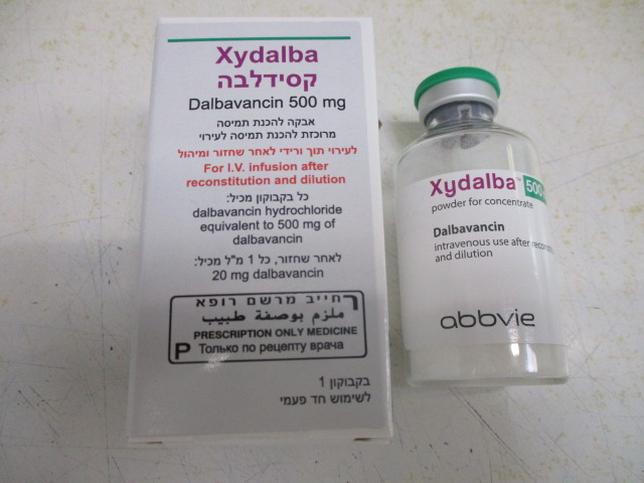Quest for the right Drug

קסידלבה XYDALBA (DALBAVANCIN)
תרופה במרשם
תרופה בסל
נרקוטיקה
ציטוטוקסיקה
צורת מתן:
תוך-ורידי : I.V
צורת מינון:
אבקה להכנת תמיסה מרוכזת לעירוי : POWDER FOR CONCENTRATE FOR SOLUTION FOR INFUSION
עלון לרופא
מינוניםPosology התוויות
Indications תופעות לוואי
Adverse reactions התוויות נגד
Contraindications אינטראקציות
Interactions מינון יתר
Overdose הריון/הנקה
Pregnancy & Lactation אוכלוסיות מיוחדות
Special populations תכונות פרמקולוגיות
Pharmacological properties מידע רוקחי
Pharmaceutical particulars אזהרת שימוש
Special Warning עלון לרופא
Physicians Leaflet
Special Warning : אזהרת שימוש
4.4 Special warnings and precautions for use Hypersensitivity reactions Dalbavancin should be administered with caution in patients known to be hypersensitive to other glycopeptides since cross-hypersensitivity may occur. If an allergic reaction to dalbavancin occurs, administration should be discontinued and appropriate therapy for the allergic reaction should be instituted. Clostridioides (formerly Clostridium) difficile-associated diarrhoea Antibacterial-associated colitis and pseudomembranous colitis have been reported with the use of nearly all antibiotics and may range in severity from mild to life threatening. Therefore, it is important to consider this diagnosis in patients who present with diarrhoea during or subsequent to the treatment with dalbavancin (see section 4.8). In such circumstance, the discontinuation of dalbavancin and the use of supportive measures together with the administration of specific treatment for Clostridioides (formerly Clostridium) difficile should be considered. These patients must never be treated with medicinal products that suppress the peristalsis. Infusion-related reactions Xydalba is to be administered via intravenous infusion, using a total infusion time of 30 minutes to minimise the risk of infusion-related reactions. Rapid intravenous infusions of glycopeptide antibacterial agents can cause reactions that resemble “Red-Man Syndrome”, including flushing of the upper body, urticaria, pruritus, and/or rash. Stopping or slowing the infusion may result in cessation of these reactions. Renal impairment Information on the efficacy and safety of dalbavancin in patients with creatinine clearance < 30 ml/min is limited. Based on simulations, dose adjustment is needed for patients with chronic renal impairment whose creatinine clearance is < 30 ml/min and who are not receiving regular haemodialysis (see sections 4.2 and 5.2). Mixed infections In mixed infections in which Gram-negative bacteria are suspected patients should also be treated with an appropriate antibacterial agent(s) against Gram-negative bacteria (see section 5.1). Non-susceptible organisms The use of antibiotics may promote the overgrowth of non-susceptible micro-organisms. If superinfection occurs during therapy, appropriate measures should be taken. Limitations of the clinical data There is limited data on safety and efficacy of dalbavancin when administered for more than two doses (one week apart). In the major trials in ABSSSI the types of infections treated were confined to cellulitis/erysipelas, abscesses and wound infections only. There is no experience with dalbavancin in the treatment of severely immunocompromised patients.
Effects on Driving
4.7 Effects on ability to drive and use machines Xydalba may have a minor influence on the ability to drive and use machines, as dizziness has been reported in a small number of patients (see section 4.8).

שימוש לפי פנקס קופ''ח כללית 1994
לא צוין
תאריך הכללה מקורי בסל
לא צוין
הגבלות
לא צוין
מידע נוסף
